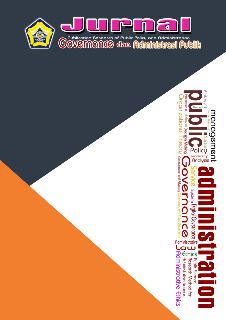Main Article Content
Abstract
Article Details
Copyright :
Authors who publish their manuscripts in this Journal agree to the following conditions:
Copyright in each article is the property of the author.
The author acknowledges that Journal of Governance and Public Administration has the right to publish for the first time with a Creative Commons Attribution 4.0 International License.
The author can enter the writing separately, regulate the non-exculsive distribution of manuscripts that have been published in this journal into other versions (for example: sent to the author's institution respository, publication into books, etc.), by acknowledging that the manuscript was first published in the Journal Governance and Public Administration;
Licence :
The Journal of Governance and Public Administration is published under the terms of the Creative Commons Attribution 4.0 International License. This license allows anyone to copy and redistribute this material in any form or format, compose, modify, and make derivatives of this material for any purpose, including commercial interests, as long as they attach credit to the Author for the original creation.
References
- Aswan. 2004. Penempatan Pegawai Negeri Sipil Pada Jabatan Struktural di Lingkungan Pemerintah Kabupaten Kapuas. Tesis. Universitas Gajah Mada.
- Bangun, Wilson. 2012. Manajemen Sumber Daya Manusia. Erlangga. Bandung.
- Gouzaji, Saydam. 2006. Manajemen Sumber Daya Manusia. Penerbit Djambatan. Yogyakarta.
- Husna Suad & Heiddjrachman. 2007. Manajemen Personalia. Penerbit BPFE. Yogyakarta.
- Jewel, LN, and Marc Siegel.2005. Industrial Psychology / Organizational Modern, Translators, A Hadyana Pudjaatmaka and Maetasari, Publisher Archan, Jakarta
- Listianto, Tony and Bambang Setiaji. 2007. Influence Motivation, Satisfaction, and Discipline Working Against Employee Performance (Case Studies in EnvironmentalOffice clerks PDAM Surakarta). [online] http:// repository.usu.ac.id. Diakses Tanggal 14 Maret 2016. Pukul. 12.30 WIB.
- Mangkunegara, AP. 2002. Manajemen Sumber Daya Manusia Perusahaan. PT Remaja Rosdakarya. Bandung.
- Meilisa. 2012.Pengaruh Pengembangan Karir dan Spesifikasi kerja terhadap Motivasi Kerja Pegawai Kantor Pelayanan Pajak Belawan. [online] http:// repository.usu.ac.id. Diakses Tanggal 14 Maret 2016. Pukul. 12.57 WIB.
- Moekijat. 2002. Analisis Jabatan. Penerbit Mandar Maju. Bandung
- Mondy R. Wayne dan Noe Robert M. 1996. Human Resource Management. Prentice hall. New York
- Muhidin dan Abdurrahman. 2007. Analisis Korelasi, Regresi, dan Jalur Dalam Penelitian. Pustaka Setia. Bandung.
- Nawawi, Hadari. 2003. Buku Perencanaan SDM untuk organisasi profit yang kompetitif. Penerbit Gadjah Mada University Press. Yogyakarta.
- Nitisemito, Alex S. 2002. Manajemen Personalia. Jakarta. Ghalia Indonesia
- Rivai, Veithzal. 2006. Performance Appraisal. Ed. 3. Jakarta: Gramedia pustaka Utama.
- Sastrohadiwiryo, B, Siswanto. 2003. Manajemen Tenaga Kerja Indonesia, edisi 2, PT. Bumu Aksara. Jakarta.
- Srie Yono, Teguh Djiwanto dan Manogar Hasibuan, 2004. Manajemen Sumber Daya Manusia. PT Bumi Aksara, Jakarta.
- Sugiyono. 2008. Metode Penelitian Kuantitatif dan Kualitatif dan R&D. Alfabeta. Bandung.
- Suwarto. 2008. Perilaku Organisasi. Buku Panduan Mahasiswa. Universitas Atmajaya Yogyakarta. Yogyakarta.
- Tetty. 2009. Analisis Terhadap Pengangkatan Jabatan Struktural Berdasarkan Undang-Undang Nomor 43 Tahun 1999 Tentang Pokok-Pokok Kepegawaian (Studi Kasus Pada Kantor wilayah Departemen Hukum dan HAM Sumatera Barat). Tesis. Universitas Sumatera Utara.
- Undang-Undang Republik Indonesia Nomor 43 Tahun 1999 Tentang Perubahan UU Nomor 8 Tahun 1974 Tentang Pokok-Pokok Kepegawaian.
- Wibowo 2007. Manajemen Perubahan. Edisi ke 2. Rajawali Pers. Jakarta.
- Wibowo. 2011. Manajemen Kinerja. Edisi ke 3. Rajawali Pers. Jakarta.
- Wibowo. 2011. Manajemen Kinerja. Edisi ke 4. PT. Raja Grapindo Persada. Jakarta.
- Wursanto. 2003. Fundamentals of organizational science. Yogyakarta: ANDI
- Garis-Garis Besar Haluan Negara (GBHN) tahun 2009
References
Aswan. 2004. Penempatan Pegawai Negeri Sipil Pada Jabatan Struktural di Lingkungan Pemerintah Kabupaten Kapuas. Tesis. Universitas Gajah Mada.
Bangun, Wilson. 2012. Manajemen Sumber Daya Manusia. Erlangga. Bandung.
Gouzaji, Saydam. 2006. Manajemen Sumber Daya Manusia. Penerbit Djambatan. Yogyakarta.
Husna Suad & Heiddjrachman. 2007. Manajemen Personalia. Penerbit BPFE. Yogyakarta.
Jewel, LN, and Marc Siegel.2005. Industrial Psychology / Organizational Modern, Translators, A Hadyana Pudjaatmaka and Maetasari, Publisher Archan, Jakarta
Listianto, Tony and Bambang Setiaji. 2007. Influence Motivation, Satisfaction, and Discipline Working Against Employee Performance (Case Studies in EnvironmentalOffice clerks PDAM Surakarta). [online] http:// repository.usu.ac.id. Diakses Tanggal 14 Maret 2016. Pukul. 12.30 WIB.
Mangkunegara, AP. 2002. Manajemen Sumber Daya Manusia Perusahaan. PT Remaja Rosdakarya. Bandung.
Meilisa. 2012.Pengaruh Pengembangan Karir dan Spesifikasi kerja terhadap Motivasi Kerja Pegawai Kantor Pelayanan Pajak Belawan. [online] http:// repository.usu.ac.id. Diakses Tanggal 14 Maret 2016. Pukul. 12.57 WIB.
Moekijat. 2002. Analisis Jabatan. Penerbit Mandar Maju. Bandung
Mondy R. Wayne dan Noe Robert M. 1996. Human Resource Management. Prentice hall. New York
Muhidin dan Abdurrahman. 2007. Analisis Korelasi, Regresi, dan Jalur Dalam Penelitian. Pustaka Setia. Bandung.
Nawawi, Hadari. 2003. Buku Perencanaan SDM untuk organisasi profit yang kompetitif. Penerbit Gadjah Mada University Press. Yogyakarta.
Nitisemito, Alex S. 2002. Manajemen Personalia. Jakarta. Ghalia Indonesia
Rivai, Veithzal. 2006. Performance Appraisal. Ed. 3. Jakarta: Gramedia pustaka Utama.
Sastrohadiwiryo, B, Siswanto. 2003. Manajemen Tenaga Kerja Indonesia, edisi 2, PT. Bumu Aksara. Jakarta.
Srie Yono, Teguh Djiwanto dan Manogar Hasibuan, 2004. Manajemen Sumber Daya Manusia. PT Bumi Aksara, Jakarta.
Sugiyono. 2008. Metode Penelitian Kuantitatif dan Kualitatif dan R&D. Alfabeta. Bandung.
Suwarto. 2008. Perilaku Organisasi. Buku Panduan Mahasiswa. Universitas Atmajaya Yogyakarta. Yogyakarta.
Tetty. 2009. Analisis Terhadap Pengangkatan Jabatan Struktural Berdasarkan Undang-Undang Nomor 43 Tahun 1999 Tentang Pokok-Pokok Kepegawaian (Studi Kasus Pada Kantor wilayah Departemen Hukum dan HAM Sumatera Barat). Tesis. Universitas Sumatera Utara.
Undang-Undang Republik Indonesia Nomor 43 Tahun 1999 Tentang Perubahan UU Nomor 8 Tahun 1974 Tentang Pokok-Pokok Kepegawaian.
Wibowo 2007. Manajemen Perubahan. Edisi ke 2. Rajawali Pers. Jakarta.
Wibowo. 2011. Manajemen Kinerja. Edisi ke 3. Rajawali Pers. Jakarta.
Wibowo. 2011. Manajemen Kinerja. Edisi ke 4. PT. Raja Grapindo Persada. Jakarta.
Wursanto. 2003. Fundamentals of organizational science. Yogyakarta: ANDI
Garis-Garis Besar Haluan Negara (GBHN) tahun 2009
